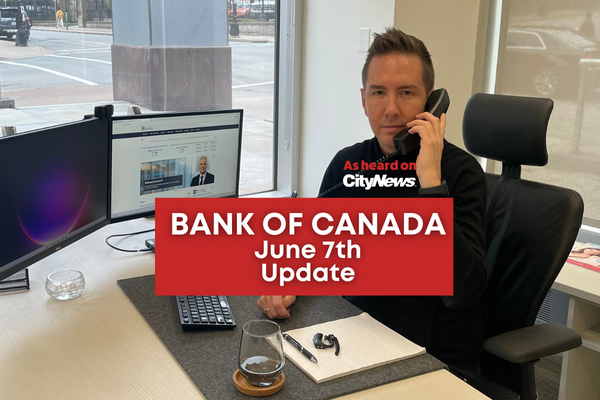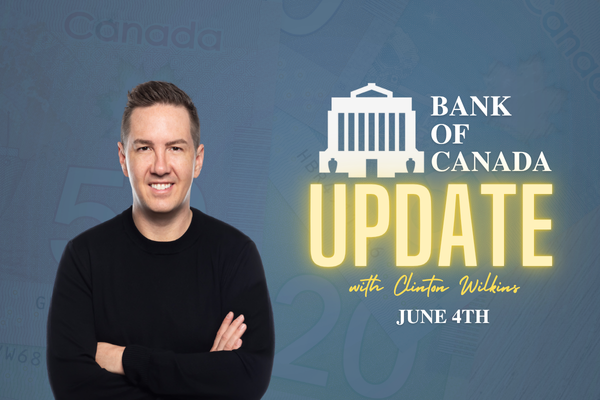Clinton Wilkins joins Todd Veinotte on 95.7 News Radio to discuss The Bank of Canada holding its key policy rate at 2.75%, marking the first pause after seven consecutive cuts.

Bank Of Canada – High Interest, High Impacts
Clinton Wilkins joins Derick Fage on CityNews to talk about the latest Bank of Canada announcement. Clinton discusses the recent key overnight interest rate increase and the impacts on consumers. The two also talk about the inevitable losses caused by a recession, and the credit profile cracks that are starting to show.
00:01
The Sam Laprade show continues on City News 1011 FM and 1310 am.
Derick Fage 00:09
Welcome back to the Sam Laprade show, Derick Fage here from Rogers TV filling in for Sam. Well, you’ve probably just heard. In our news just a few moments ago, the Bank of Canada raised its overnight rate by 25 basis points to 4.75%. Recent economic data has suggested the Canadian economy is running hotter than forecasters had expected, raising concerns about the inflation outlook. And I’m sure when you hear the economy is running hot, you’re probably thinking to yourself, that’s a good thing. I don’t have answers when it comes to the reasons behind this. But I’m hoping my next guest does I am joined by Clinton Wilkins from a Centum Home Lenders limited. Good morning, Clinton.
Clinton Wilkins 00:56
Thanks for having me, Derick, how are you?
The Bank of Canada raises key overnight rate
Derick Fage 00:58
I’m doing great Clinton. And I think there is a lot of confusion around this sort of thing Clinton when, when we look at, you know just how much inflation has gone up. And people are struggling in so many different ways when it comes to, you know, paying for their fuel and utilities and food, putting groceries on the table. And then we raise the interest rate to borrow money can can you explain why the Bank of Canada makes a decision like this Clinton,
Clinton Wilkins 01:31
Part of the reason that they made this decision is the inflation numbers are not where they need to be or where they wanted them to be kind of at this stage, we actually heard reports, and it was on the news on many media outlets, that the inflation rates have actually increased over the last period. And that’s part of the reason that the Bank of Canada’s increasing this key rate. Economists were really on the fence, I think, leading up to this announcement, there was one school of thought to say, you know, they’ve done all the increase of the increases that they can do, they need to wait and see and kind of see what’s going to happen, you know, 1,2,3 months down the road. And then there were another set of economists saying that there is a little bit more room for the Bank of Canada to increase. And you know, those other 50% of economists were, you know, predicting that there was going to be a 25 basis point increase in this key overnight rate, to just try to stay that inflation even more.
The impacts of higher interest rates on consumers
Clinton Wilkins 02:22
Obviously, a couple of the big inflation drivers, you hit on it already. One is housing costs. And I think the other is food costs. Those are those things are really impacting Canadians every day. And we’re certainly feeling the impacts. When we go to the till, when we go to the grocery store, and we’re trying to buy our groceries, that cost is higher. And now today, any consumers that are in a variable rate mortgage product, or have a home equity line of credit, or really have any debt product that’s tied to this key overnight rate, their cost of borrowing is going up.
Derick Fage 02:53
Okay, but at the same time, I think a lot of listeners say to themselves, we understand, I guess the formula to a certain extent, but at the same time, is this not going to make it harder to pay my mortgage, if I have my mortgage renewal coming up, or I don’t have a fixed rate, and I’m at a variable rate, this is going to hurt me, while I’m also struggling with all of those other things we just talked about
Clinton Wilkins 03:21
100% it is. And you know, us as Canadians, we sat at home for two years and didn’t spend any of our money, Derick. What’s happening now is, obviously as things reopen, and you know, I think things are wide open right now, we had a lot of funds available to go and spend, and that’s really impacted things like supply chain, and that started driving up the cost of a lot of these consumer goods. So by increasing these rates, it is increasing the cost of borrowing, and taking, you know, a big chunk of money out of consumers pockets every day, which they’re trying to get consumers to reduce their spending. And, you know, it’s very tough, because, you know, for two years, we were told to stay home and, and not do anything, and we didn’t spend and now really the government is telling us to say, you know, we can go out and we can be live our normal lives, but now don’t spend on consumer goods. So it is a very, you know, tough situation.
“The increases that we’ve seen in the rates the last 12 months have not been enough.”
Clinton Wilkins 04:49
And, you know, I think our real concern is, you know, the government is trying to cause a recession here. And by a recession, there’s going to be major job losses. And, you know, I think that we need to kind of balance out the increase in the inflation and slow the spend on consumer goods with that recession that’s going to come down down the road. So I think both are going to have negative, you know, economic implications. Right now, the increases that we’ve seen in the rates the last 12 months Derick, have not been enough and that’s really what the Bank of Canada is saying today by increasing it.
Derick Fage 03:29
It seems out of touch in some ways too Clinton because as you just described, like during the pandemic, we had locked downs and people aren’t spending money and then at the Same time, during those lock downs, we have all of these small businesses that have have have struggled. They are not up to even what they were doing, you know, you know, financially pre pandemic, and then we tell, then all of a sudden, we tell consumers hold on, we need you to slow down buying things, so that we can we can help bring the inflation rates down. Again, I just, I wonder
There’s going to be losses in a recession
Clinton Wilkins 04:49
There’s going to be losses. For sure.
Derick Fage 04:50
Yeah but why are they so out of touch with those kinds of things, Clinton?
Clinton Wilkins 05:36
You know, I think maybe things were too low for too long, Derick, they should have started the increases earlier, it was basically a runaway train when it left the station. And that’s what they’re trying to get under control. And it’s may be several months, if not years to kind of get inflation under control. And I think that’s a concern for Canadians. It’s not just the Canadians that are in a variable rate mortgage, though, you know that we’ve lots of Canadians that are in a fixed rate that are coming up for renewal. And they’re used to very, very low rates, like we have customers that are sub 2%. What happens when those consumers come up for renewal? And I think, in some cases, those consumers are in even worse shape, because they’re living in this false reality that the rates are going to be low for a long time. And the Bank of Canada has gotten this right 0% of the time, right, you hit on it a little bit. You know, they didn’t get it right when they said during the pandemic rates are going to be low for the foreseeable future. Well, that wasn’t true. And now we’re obviously in an increasing rate environment, when consumers really thought maybe we were going to be more in a plateau situation, I think the goal now needs to be that the rates will plateau. Because historically, after a plateau situation, the rates will go down again, especially if we start going into a recession. So you know, there’s no right answer. And I think that’s what’s really tough. And this is impacting different people in different ways.
Canadian credit profile cracks are starting to emerge
Clinton Wilkins 07:37
But I can tell you that Equifax and TransUnion have already put out information that they’re starting to see cracks in the Canadian credit profile, Canadians are starting to miss their loan payments, maybe not so much their mortgage payments, but there are other credit facilities that they’re starting to miss their payments on. So the pain is already starting, we’re starting certainly talking to consumers every day. And they are feeling the pinch, I can tell you, we’re talking to customers that are coming up for renewal or maybe in the middle of their term. And they’re looking at taking longer amortizations on their mortgage, to reduce the borrowing costs to help not just with the mortgage, but with everything else that obviously has gone up in costs as well.
Derick Fage 07:34
Clinton, I think you touched on something else that we’ve discussed, in particular, I remember Rob Snow talking about this as well, with an economist or financial expert, and that is, you know, maybe we we’ve brought them historically too low. And maybe there should be a point, you know, like, the government looks at inflation. And you know, for the last 25 years, they’ve decided that, you know, 2% is, you know, sort of the goal of what we want to what we want to stay at when it comes to inflation, I wonder does the bank is it time for the Bank of Canada to kind of do the same thing where, you know, we shouldn’t get to a point where it’s 1.25% or 1%, maybe maybe it needs to stay at 3% to make this realistic, so that if something like this happens within our economy, people aren’t, aren’t as desperate as they are right now.
Is it time for the Bank of Canada to cut interest rates?
Clinton Wilkins 08:29
I agree. I think the pendulum swings too far, both ways. So I think it has swung too high now. And I think maybe during the pandemic had swung too low. But there was so much uncertainty, and people were really worried about their jobs. And during the pandemic, a lot of people did lose their jobs, but not only to the bank can reduce the cost of borrowing. The banks also stepped up to the plate, obviously, with help from the government around things like deferrals and things like that. So there was really it was multi pronged, but that’s what we’re paying for now, there was really too much money pumped into the economy during kind of those harder times. We should have had losses earlier on. But the losses are coming, which is unfortunate. And we’re going to you know, I think have a you know, a harder economic time, kind of in the back half of this year. And I think going into 2024, I think we’re going to see, you know, really what impacts these higher rates are going to have on the economy. You know, I don’t think it’s going to be rainbows and unicorns here for the next several months and into the following years until this really kind of balances out. I agree with you, maybe 2% for inflation isn’t realistic, maybe it needs to be 3%. And maybe their rates don’t need to go as low or as high. I think there is a median mark. And typically what they said before the median mark for rates is somewhere around 5%. But we’re far beyond that now at this point.
Derick Fage 09:50
What advice are you giving to clients right now Clinton?
“Sometimes a fixed rate is a long term solution to a short term problem”
Clinton Wilkins 09:53
A lot of consumers are choosing to do a shorter term fix Derick. Is that the right answer? Not for everyone. You know, if you’re in a variable rate, you probably took a variable rate for a reason. And really, the rates have been high for a year, we don’t know when they’re going to go down. So I think you really need to think about that and think about the dollars and cents that are in your household. Obviously, the pros on a variable, if you break your mortgage early, it’s only three months interest. And you can also convert your variable rate into a fixed rate at any time with no penalty. I think on the flip side of the coin, the fixed rates currently are lower than variable, which never ever happens, but we’re not in a regular time. You need to think about is a fixed rate for you because obviously, if you break your fixed rate mortgage early, you’re gonna pay a much higher penalty. And sometimes a fixed rate is a long term solution to a short term problem. So I think seek the advice of an unbiased mortgage professional in your area. There’s a lot of moving parts. And I can tell you, I’m glad to have being part of the conversation. I’ve been doing this for 17 years, and I’ve done over 5000 transactions and like $1.4 billion worth of mortgages. So I think I’ve always seen something. But this is always changing. So I’m glad to be part of the conversation.
Derick Fage 10:58
And we’re glad to have you as part as part of this conversation today. Clinton, this has been a great conversation. Thank you so much for joining us.
Clinton Wilkins 11:06
Thanks Derick for having me.
Derick Fage 11:07
No, no really appreciate it. Again, that’s Clinton Wilkins at Centum Home Lenders limited if you’re looking for somebody to help you out through through these difficult times give Clinton a call. I really think he broke it down so well for us and that this is a conversation I think, you know, a members of the public I think we need to be having a little bit more to get a better understanding and to hold the Bank of Canada up to a greater standard and our governments up to a greater standard when it comes to things like this. Thank you so much. Really appreciate. Again, Clinton, you
Derick Fage 11:42
you spending some time with us. We’re going to take a break. We’ll be back with more. This is Derick Fagr filling in on the Sam Laprade show. You’re watching on Rogers TV and listening on CityNews.
Derick Fage 11:51
Sam Laprade will be right back on City News, 1011 FM and 1310am.


